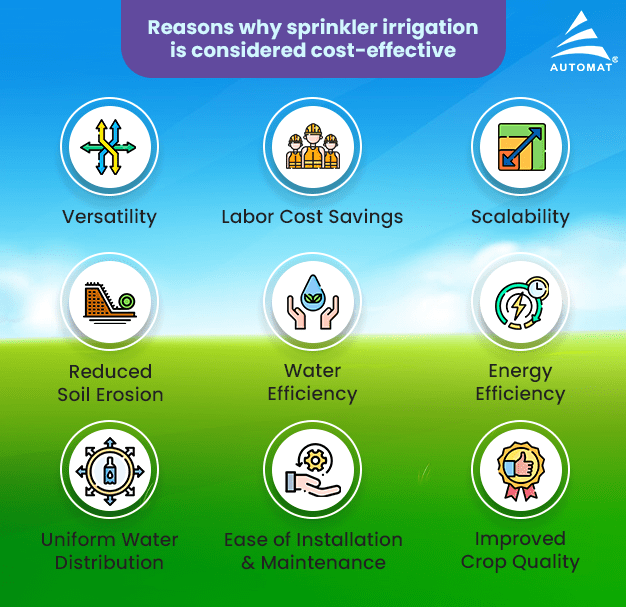
Sprinkler irrigation is a cost-effective solution for agricultural and landscape irrigation systems. This method involves the use of a network of pipes and pumps to distribute water in the form of droplets through the air, simulating natural rainfall.
Why is Sprinkler Irrigation Cost-Effective?

Several reasons why sprinkler irrigation is considered cost-effective are as follows:
1. Water Efficiency
Sprinkler systems, as a water irrigation system, can be designed to distribute water precisely where it is needed, minimizing water wastage. This efficiency is crucial in regions where water resources are limited or during periods of drought.
2. Labor Savings
Once installed, sprinkler systems require minimal labor than surface irrigation. Automated controllers can be programmed to turn the system on and off at specific times, reducing the need for constant manual oversight.
3. Uniform Water Distribution
Sprinklers are designed to provide even water distribution across the irrigated area. This uniformity helps ensure that crops receive consistent moisture, promoting healthier growth and maximizing yield potential.
4. Versatility
Sprinkler systems can be adapted to different types of crops, terrains, and soil types. They are suitable for a variety of agricultural applications, making them a versatile and cost-effective solution for different farming practices.
5. Reduced Soil Erosion
The gentle application of water through sprinklers helps minimize soil erosion compared to some other irrigation methods. This is especially beneficial on sloping terrain where erosion can be a significant concern.
6. Ease of Installation and Maintenance
Sprinkler systems are relatively easy to install, and routine maintenance is typically straightforward. This simplicity can contribute to cost savings both in terms of initial setup and ongoing upkeep.
Read More: Know How Sprinkler Irrigation Systems Work?
7. Scalability
Sprinkler systems can be scaled to fit the size of the irrigated area. Whether you have a small garden or a large agricultural field, sprinkler systems can be designed to meet your specific needs.
8. Energy Efficiency
While there is an energy cost associated with operating pumps in sprinkler systems, modern designs often incorporate energy-efficient technologies. Additionally, the ability to automate the system allows for optimized energy usage.
9. Improved Crop Quality
Consistent and controlled irrigation with sprinkler systems can contribute to improved crop quality by avoiding over-watering or under-watering issues.
Read More: Discover How to Improve Your Irrigation Efficiency?
Conclusion
According to the Indian Council of Agricultural Research, properly 3designed and managed drip and sprinkler irrigation systems have irrigation efficiency of about 90% and 70%. It’s important to note that the cost-effectiveness of sprinkler irrigation depends on various factors, including the local climate, the type of crops being grown, the size of the irrigated area, and the specific design and components of the irrigation system. Before implementing a sprinkler irrigation system, it’s advisable to conduct a thorough assessment to ensure it aligns with the specific needs and conditions of the area in question.




